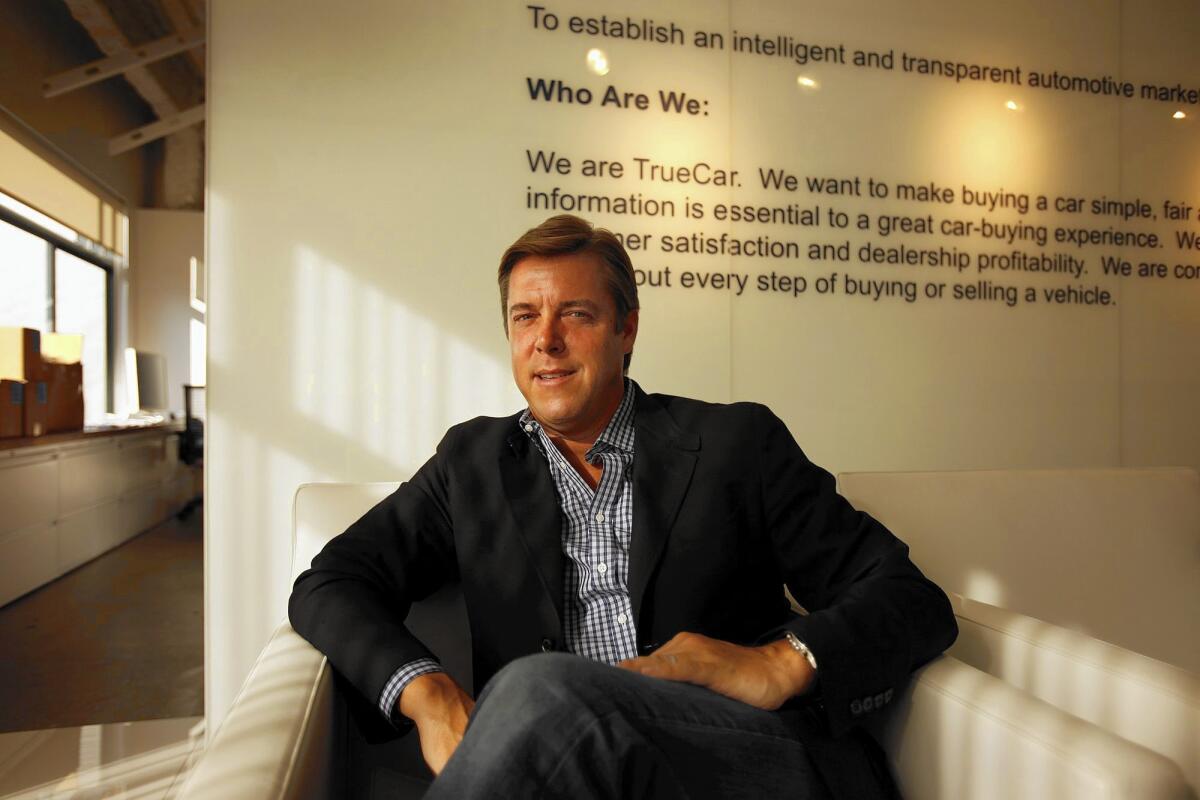TrueCar posts big 2nd-quarter loss; CEO Scott Painter to step down

TrueCar CEO Scott Painter acknowledged that he sometimes had a “strained relationship” with the very dealers the company needs to work with.
Scott Painter, the often blunt founder and chief executive of TrueCar Inc., plans to step down as the company’s head this year after a search is conducted for a successor.
Painter has long been the public face of the Santa Monica company, which has roiled the car business by allowing consumers to buy vehicles at lower prices without the traditional haggling with dealers.
The abrupt resignation, announced Thursday, follows disappointing earnings, a slowing of TrueCar’s once rapid growth and other setbacks, including the loss of a key source of business. It comes a little more than a year after the firm’s May 2014 initial public offering.
“After a decade of building TrueCar from an idea into a public company, I have come to the conclusion reached by many founders and entrepreneurs in my position: It is time for a change,” said Painter in a conference call after the earnings release. He expects a successor to take office by year-end.
Painter, 46, will continue as chairman of TrueCar’s board of directors. He owns almost 12% of the company, a stake worth $59 million as of Thursday.
TrueCar, founded in 2005, operates a digital platform that helps consumers shop and price cars. Buyers can enter a vehicle’s make and model to generate three firm offers from participating dealers. TrueCar takes a $299 cut from each new-car transaction and $399 for used vehicles. It has about 10,000 car franchises in its network.
That business model has made TrueCar controversial in the auto industry. New-car dealers have complained that its pricing system drives down profits. They also have objected to Painter’s strong personality and his mantra that cars were merely commodities and consumers should make their purchase decision solely on price. That was at odds with dealers, who pitched the value of their community-based businesses and service.
“His confidence clashed at times with the dealers, who by nature think they are center of automotive universe,” said Jesse Toprak, an auto industry consultant and a former general manager of a dealership who has worked for TrueCar and some of its competitors.
Painter acknowledged Thursday that he sometimes had a “strained relationship with the very dealer community we exist to serve.”
“I do not believe that I have always communicated our value proposition to investors as effectively as I could have. Those things are on me.”
But he added, “TrueCar was born from my love for cars and my entrepreneurial passion for solving real problems.”
The resignation came as TrueCar reported another big quarterly loss. The company lost $14.7 million in the second quarter, compared with a loss of $15 million in the same period a year ago.
Revenue increased from $50.5 million to $65.3 million, but that was seen as a disappointment. TrueCar had projected revenue of $67 million to $69 million. It now says that sales for the rest of the year would be lower than expected.
The company now says its revenue for the full year will come in at $252 million to $258 million, a 10% to 11% decrease from the previously announced range of $280 million to $290 million.
“As the CEO, I bear the ultimate responsibility for our performance and falling short of expectations, including my own,” Painter said Thursday.
TrueCar took a big hit last month when AutoNation, the nation’s largest dealer group, said it would no longer use TrueCar to route clients to its stores, a move expected to cost the company about $7 million in annual revenue.
TrueCar also faces a Los Angeles County Superior Court lawsuit filed by the California New Car Dealers Assn. in May. It alleges that TrueCar violates state car sales regulations by acting as a dealer and broker in car sales transactions but doesn’t have the proper licensing for the business.
That triggered a shareholder lawsuit filed in federal court in Los Angeles claiming that investors have lost money because TrueCar’s business practices don’t comply with sales laws in some states. TrueCar says it is in compliance.
“We still think that TrueCar is a dealer and auto broker and should be licensed as such. Perhaps a new leader will understand their obligation to comply with the law,” said Brian Maas, president of the New Car Dealers Assn., after learning of Painter’s planned departure.
Still, Toprak, the auto industry consultant, noted that thousands of dealers choose to work with TrueCar because it streamlines price negotiations and the time it takes to buy a vehicle, leaving happy customers.
Sameet Sinha, an analyst with B. Riley & Co., said it is an open question whether Painter’s resignation will assuage dealers who are not in TrueCar’s fold, or are considering AutoNation’s lead and might leave.
It was not only Painter’s self-admitted “strained relationship” with dealers that created difficulties for TrueCar, but the company’s practices, she said.
AutoNation severed its relationship in part because TrueCar wanted to cull all of its sales information to see if any of its customers had visited TrueCar’s digital platform during their car search. TrueCar argues that is required to make sure it gets paid correctly. But dealers see it as intrusive and results in them paying TrueCar transaction fees it doesn’t deserve.
“The business practices will also have to undergo a change,” Sinha said.
TrueCar shares have fallen about 75% this year. They slipped 37 cents, or 6.3%, to $5.54 prior to Thursday’s earnings announcement and news of Painter’s departure.
Follow me on Twitter (@LATimesJerry), Facebook and Google+.
ALSO:
Researchers hack a Tesla Model S, bring car to stop
Tesla cuts annual production forecast; second-quarter loss widens
Auto sales strong in July on SUV, luxury demand







